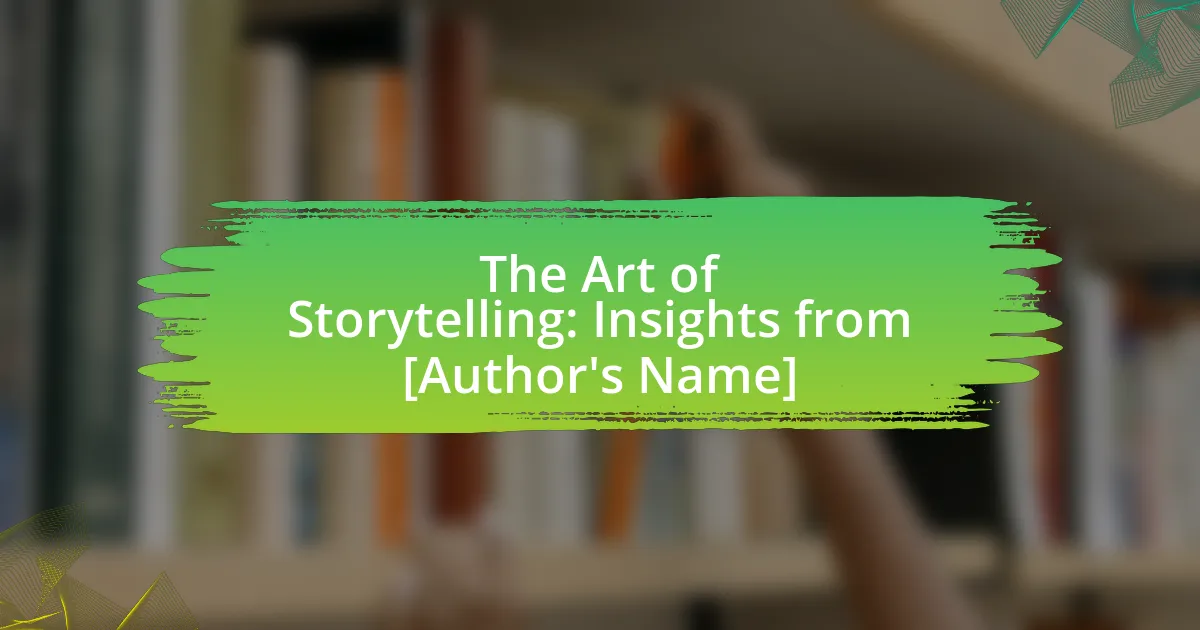Emerging voices in literature are new authors who are gaining recognition for their innovative storytelling and diverse perspectives. This article explores the significance of recognizing these authors, the challenges they face in the publishing industry, and the unique characteristics that set them apart from established writers. It highlights notable emerging authors to watch in 2024, the genres they are exploring, and the impact of personal experiences on their writing. Additionally, the article discusses how readers can support these authors and the role of social media and book clubs in promoting new literature.
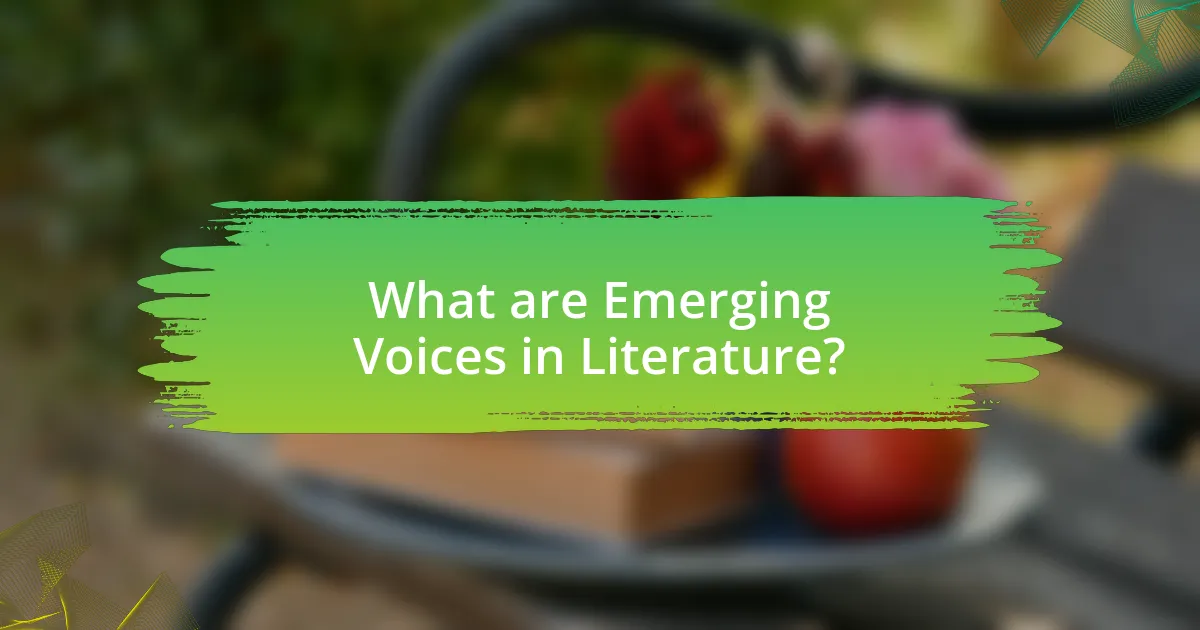
What are Emerging Voices in Literature?
Emerging voices in literature refer to new and innovative authors who are gaining recognition for their unique perspectives and storytelling styles. These writers often bring fresh narratives that reflect diverse experiences and cultural backgrounds, contributing to the evolution of contemporary literature. For example, the rise of authors from underrepresented communities has led to a broader understanding of societal issues, as seen in the works of writers like Ocean Vuong and Brit Bennett, who have received critical acclaim for their contributions. This trend highlights the importance of inclusivity in literature, as emerging voices challenge traditional norms and engage readers with their distinct viewpoints.
Why is it important to recognize new authors?
Recognizing new authors is important because it fosters diversity in literature and introduces fresh perspectives. New authors often bring unique voices and innovative ideas that challenge established norms, enriching the literary landscape. For instance, a study by the National Endowment for the Arts found that exposure to diverse authors can enhance readers’ empathy and understanding of different cultures. By acknowledging and promoting new talent, the literary community can ensure a broader representation of experiences and ideas, which is essential for cultural growth and evolution.
How do emerging voices influence literary trends?
Emerging voices influence literary trends by introducing fresh perspectives and innovative storytelling techniques that resonate with contemporary audiences. These new authors often challenge established norms and genres, reflecting diverse experiences and cultural backgrounds, which can lead to shifts in reader preferences and industry standards. For instance, the rise of authors like Ocean Vuong and Brit Bennett has brought attention to themes of identity and race, prompting publishers to seek more inclusive narratives. This shift is evidenced by increased sales of books that feature underrepresented voices, indicating a growing demand for literature that reflects a broader spectrum of human experience.
What challenges do new authors face in the publishing industry?
New authors face significant challenges in the publishing industry, primarily including market saturation, lack of visibility, and difficulties in securing representation. The publishing landscape is highly competitive, with thousands of titles released annually, making it hard for new authors to stand out. Additionally, many new authors struggle to gain visibility due to limited marketing budgets and established networks, which are often crucial for book promotion. Furthermore, obtaining a literary agent can be challenging, as agents typically prefer to work with authors who have a proven track record or substantial platform, leaving many new writers without representation. These factors collectively hinder new authors’ ability to successfully launch their careers in publishing.
What defines an emerging author?
An emerging author is typically defined as a writer who is in the early stages of their career, often having published one or few works, and is gaining recognition within the literary community. This recognition can stem from participation in literary contests, inclusion in anthologies, or positive reviews from established critics. Emerging authors often represent new voices and perspectives, contributing to the diversity of literature. For instance, the rise of self-publishing and digital platforms has enabled many emerging authors to reach audiences more easily, as seen with the success of authors like Colleen Hoover, who gained prominence through social media and self-published works.
What characteristics set new authors apart from established ones?
New authors are often characterized by their fresh perspectives and innovative storytelling techniques, which distinguish them from established authors who typically have a proven track record and a loyal readership. New authors frequently experiment with genre-blending and unconventional narrative structures, reflecting contemporary issues and diverse voices that resonate with modern audiences. Established authors, on the other hand, usually rely on their established styles and themes that have garnered them recognition and success over time. This distinction is evident in the rise of self-publishing platforms, which have enabled new authors to reach audiences directly, showcasing their unique voices without the constraints of traditional publishing.
How do debut novels differ from those of seasoned writers?
Debut novels typically differ from those of seasoned writers in their exploration of fresh themes and styles, often reflecting the author’s unique voice and perspective. New authors frequently experiment with narrative techniques and character development, as they are less constrained by established conventions and expectations. In contrast, seasoned writers often demonstrate a refined mastery of structure and pacing, drawing from their extensive experience to create more polished and cohesive works. This distinction is evident in the varying levels of complexity in plot and character arcs, with debut novels often showcasing raw, unfiltered creativity while seasoned authors provide a more nuanced and layered storytelling approach.
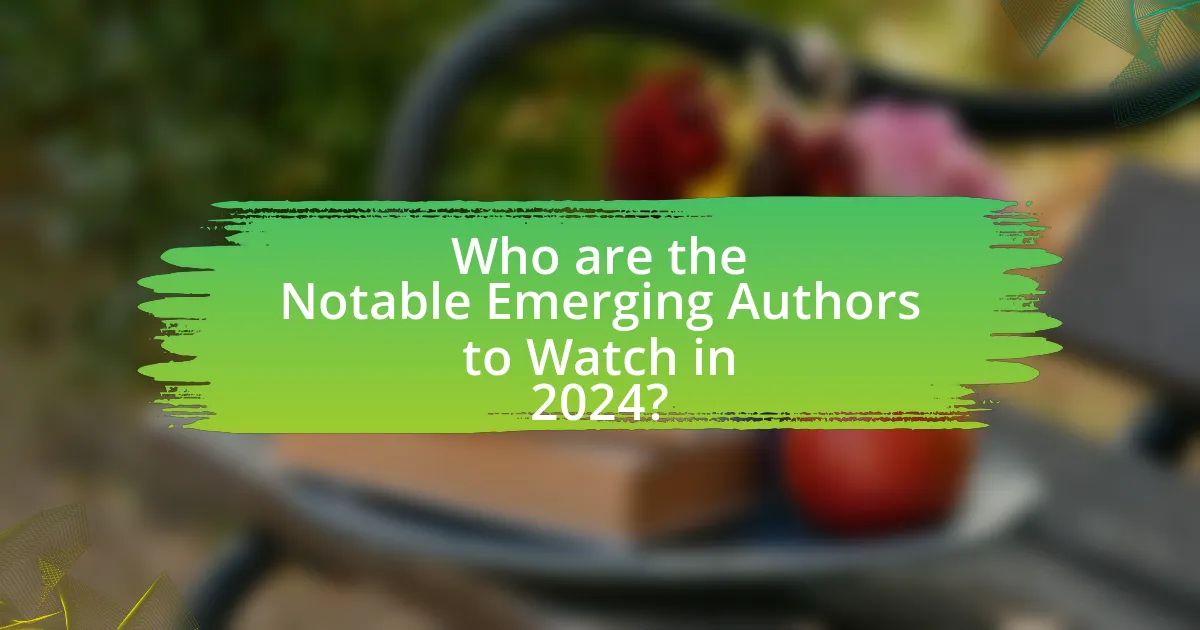
Who are the Notable Emerging Authors to Watch in 2024?
Notable emerging authors to watch in 2024 include Asha Lemmie, known for her debut novel “Fifty Words for Rain,” which received critical acclaim and highlights themes of identity and resilience. Another author is Amina Akhtar, whose work “The Other Woman” has garnered attention for its gripping narrative and exploration of complex relationships. Additionally, the poet and novelist A. J. Verdelle is gaining recognition for her unique voice and storytelling in contemporary literature. These authors are making significant impacts in the literary world, showcasing diverse perspectives and innovative narratives.
What genres are these new authors exploring?
New authors are exploring genres such as speculative fiction, contemporary romance, and psychological thrillers. Speculative fiction allows them to push boundaries and address societal issues through imaginative narratives. Contemporary romance often reflects modern relationships and cultural dynamics, while psychological thrillers delve into the complexities of the human mind, engaging readers with suspenseful plots. These genres are gaining traction as they resonate with current trends and reader interests.
How do genre preferences reflect current societal themes?
Genre preferences reflect current societal themes by serving as a mirror to the collective consciousness and cultural dynamics of a given time. For instance, the rise of dystopian fiction in recent years correlates with societal anxieties surrounding issues like climate change, political instability, and technological surveillance. According to a 2021 study by the Pew Research Center, 70% of readers reported that they gravitate towards genres that resonate with their personal experiences and societal concerns, indicating a direct link between genre popularity and prevailing social issues. This trend illustrates how literature not only entertains but also engages with and critiques the realities of contemporary life.
What unique storytelling techniques are being employed?
Unique storytelling techniques being employed by emerging authors in 2024 include non-linear narratives, immersive world-building, and multi-perspective storytelling. Non-linear narratives allow authors to present events out of chronological order, creating suspense and engaging readers in piecing together the story. Immersive world-building enhances the reader’s experience by crafting detailed settings that feel authentic and lived-in, often drawing on cultural elements to enrich the narrative. Multi-perspective storytelling enables authors to explore different characters’ viewpoints, providing a more nuanced understanding of the plot and themes. These techniques reflect a shift towards innovative narrative forms that challenge traditional storytelling conventions.
What are the backgrounds of these emerging authors?
Emerging authors often come from diverse backgrounds that influence their writing styles and themes. Many have academic qualifications in literature, creative writing, or related fields, while others may have professional experiences in journalism, education, or the arts. For instance, some authors draw inspiration from their cultural heritage, incorporating elements of their upbringing into their narratives, which can resonate with a broader audience. Additionally, a significant number of these authors have faced unique life challenges, such as immigration or socioeconomic hardships, which shape their perspectives and storytelling. This variety in backgrounds contributes to a rich tapestry of voices in contemporary literature, reflecting a wide range of experiences and viewpoints.
How do personal experiences shape their writing?
Personal experiences significantly shape writers’ narratives, themes, and character development. These experiences provide unique perspectives that influence the authenticity and emotional depth of their work. For instance, authors often draw from their backgrounds, cultures, and life events to create relatable characters and compelling plots. Research indicates that writers who incorporate personal experiences tend to produce more resonant and impactful stories, as evidenced by the success of authors like Chimamanda Ngozi Adichie and Khaled Hosseini, who weave their life stories into their narratives, enhancing reader connection and engagement.
What educational paths do these authors typically follow?
Emerging authors typically follow diverse educational paths, often including degrees in creative writing, literature, or related fields. Many have also pursued studies in disciplines such as journalism, communications, or even the humanities, which provide a strong foundation for storytelling and critical analysis. For instance, a significant number of successful authors have attended prestigious writing programs or workshops, such as those offered by the Iowa Writers’ Workshop or the Bread Loaf Writers’ Conference, which are known for cultivating literary talent. This educational background equips them with essential skills in narrative structure, character development, and thematic exploration, contributing to their unique voices in contemporary literature.
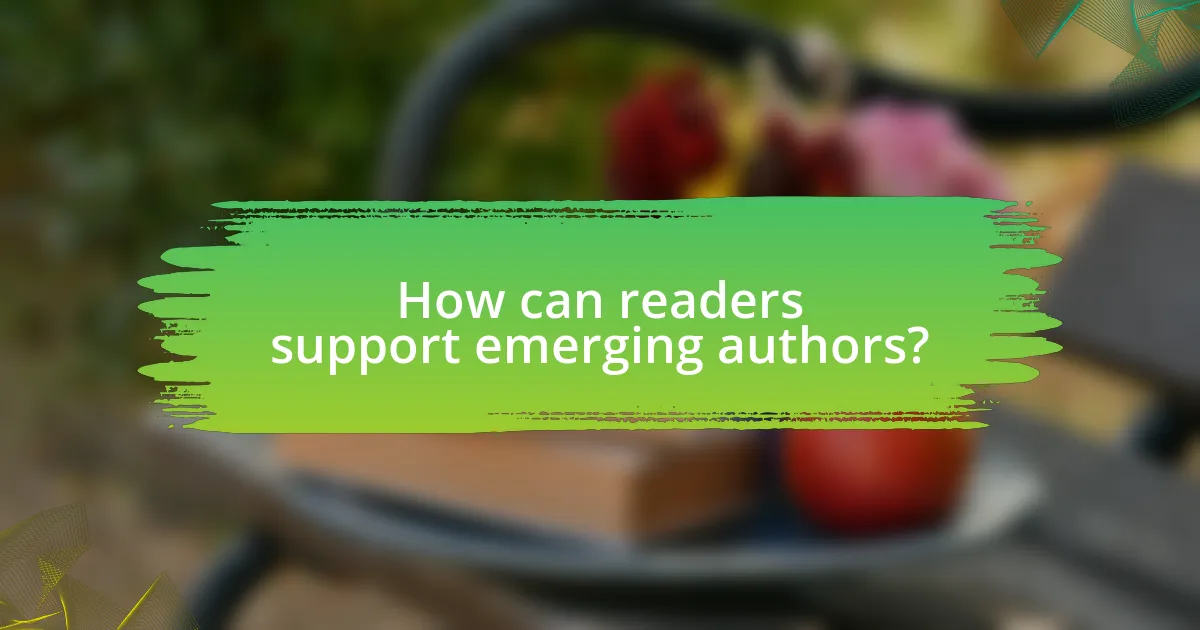
How can readers support emerging authors?
Readers can support emerging authors by purchasing their books, leaving reviews, and promoting their work on social media. Purchasing books directly contributes to the authors’ sales and visibility, which is crucial for their success in a competitive market. Leaving reviews helps to increase the book’s credibility and can influence potential readers’ decisions, as studies show that 70% of consumers trust online reviews as much as personal recommendations. Promoting authors on social media expands their reach and can lead to increased readership, as platforms like Twitter and Instagram have become vital for authors to connect with audiences.
What platforms are best for discovering new literature?
The best platforms for discovering new literature include Goodreads, Book Riot, and social media channels like Instagram and TikTok. Goodreads offers user-generated reviews and recommendations, making it a valuable resource for readers seeking new titles. Book Riot curates lists and articles focused on diverse and emerging authors, providing insights into contemporary literature. Social media platforms, particularly Instagram (often referred to as Bookstagram) and TikTok (known for BookTok), have become influential in promoting new books and authors through engaging content and community interactions. These platforms collectively enhance visibility for emerging voices in literature, making them essential for readers looking to explore new works.
How do social media and book blogs influence readership?
Social media and book blogs significantly influence readership by enhancing visibility and engagement with new authors. Platforms like Instagram, Twitter, and TikTok allow readers to discover books through recommendations, reviews, and community discussions, which can lead to increased sales and readership. For instance, a study by the Pew Research Center found that 30% of adults in the U.S. reported discovering books through social media, highlighting its role in shaping reading habits. Additionally, book blogs provide in-depth reviews and author interviews, fostering a deeper connection between readers and emerging voices, which can drive interest and loyalty towards new authors.
What role do book clubs play in promoting new authors?
Book clubs play a significant role in promoting new authors by providing a platform for readers to discover and discuss their works. These clubs often select books by emerging authors, which increases visibility and encourages word-of-mouth recommendations among members. Research indicates that book clubs can boost sales for new titles; for instance, a study by the Book Industry Study Group found that book club selections can lead to a 30% increase in sales for featured titles. Additionally, discussions within book clubs can create a community around new authors, fostering a loyal readership that supports their future works.
What are some practical tips for engaging with new authors?
To effectively engage with new authors, actively participate in literary events such as book signings, readings, and author panels. These events provide opportunities for direct interaction, allowing readers to ask questions and share feedback. Additionally, utilizing social media platforms to follow and interact with authors can foster a sense of community and support. Engaging with their content, such as sharing posts or leaving thoughtful comments, encourages dialogue and builds relationships. Furthermore, joining online book clubs or forums dedicated to new authors can facilitate discussions and recommendations, enhancing the overall experience of discovering emerging voices.
How can readers provide constructive feedback to debut authors?
Readers can provide constructive feedback to debut authors by offering specific, actionable insights on elements such as character development, plot structure, and writing style. This feedback should focus on what resonated well and what could be improved, allowing authors to understand their strengths and weaknesses. For instance, instead of saying “I didn’t like the character,” a reader could specify, “The character’s motivations were unclear, which made it hard to connect with them.” This type of detailed feedback helps authors refine their craft and enhances their future works.
What are the benefits of attending author events and readings?
Attending author events and readings provides valuable opportunities for direct engagement with writers, enhancing the reader’s understanding of their work. These events allow attendees to gain insights into the author’s creative process, motivations, and the themes explored in their writing. Furthermore, participating in such gatherings fosters a sense of community among readers and writers, encouraging discussions and connections that can lead to deeper appreciation of literature. Research indicates that live interactions with authors can significantly enhance readers’ emotional connection to the text, making the reading experience more impactful.
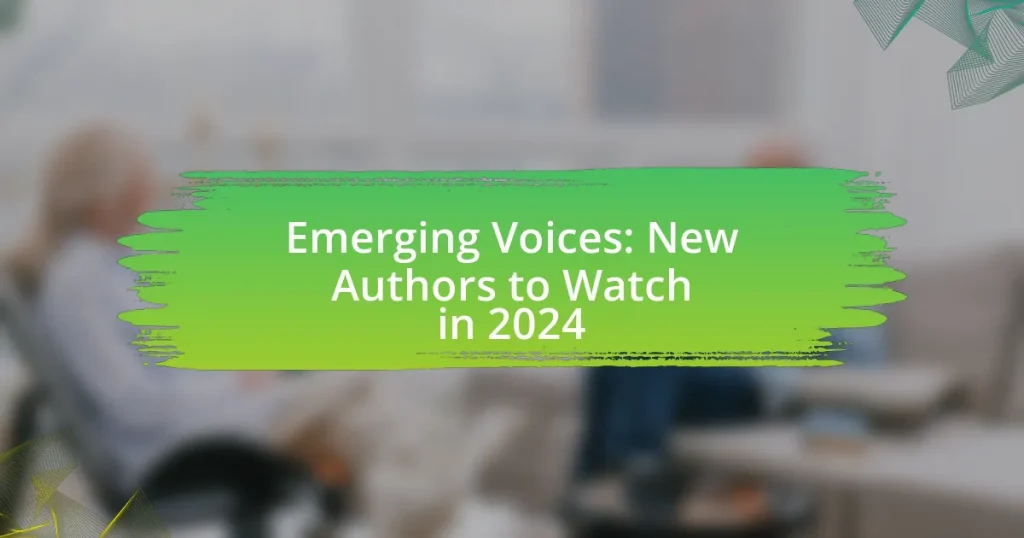
![From Manuscript to Masterpiece: The Publishing Journey of [Author’s Name]](https://hotkeyblog.com/wp-content/uploads/Featured-image-From-Manuscript-to-Masterpiece-The-Publishing-Journey-of-Authors-Name-150x150.webp)



